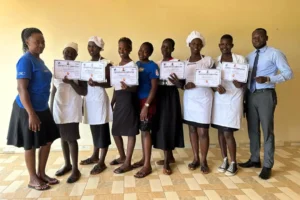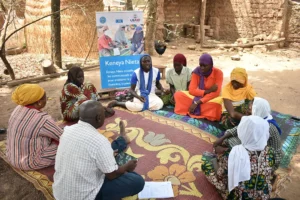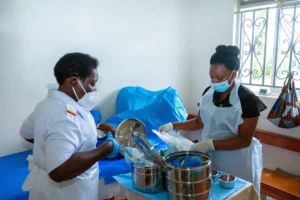Lukungu Sospetari (right) and his wife during a home visit by the sub-district health worker to collect a TB sputum sample. Photo credit: USAID RHITES-EC
Africa
Africa’s population continues to expand and is expected to reach 2.5 billion people by 2050. With this growth, the region faces critical challenges in creating and sustaining long-term health practices. Many countries still contend with high levels of child and maternal mortality, and many health systems are unable to cope with the growing dual burden of HIV/AIDS, malaria, tuberculosis (TB), malnutrition, among others, and emerging infectious diseases, such as COVID-19. The COVID-19 pandemic has put excessive constraints on health workers performance, including shortages in medicine and supplies, high turnover, and limited supervision.
Despite the pandemic and existing health issues, the region has made remarkable progress strengthening health systems in tandem with regional and global partners. However, more work needs to be done to improve control of epidemics, access to quality health services, and maternal and child mortality. The highest rates of child mortality are still in sub-Saharan Africa – where one in nine children dies before age five, more than 16 times the average for developed regions. With URC’s continued contribution improving quality of maternal and neonatal health services and strengthening quality management systems, we hope to continue to dramatically impact reduced mortality rates in Africa.
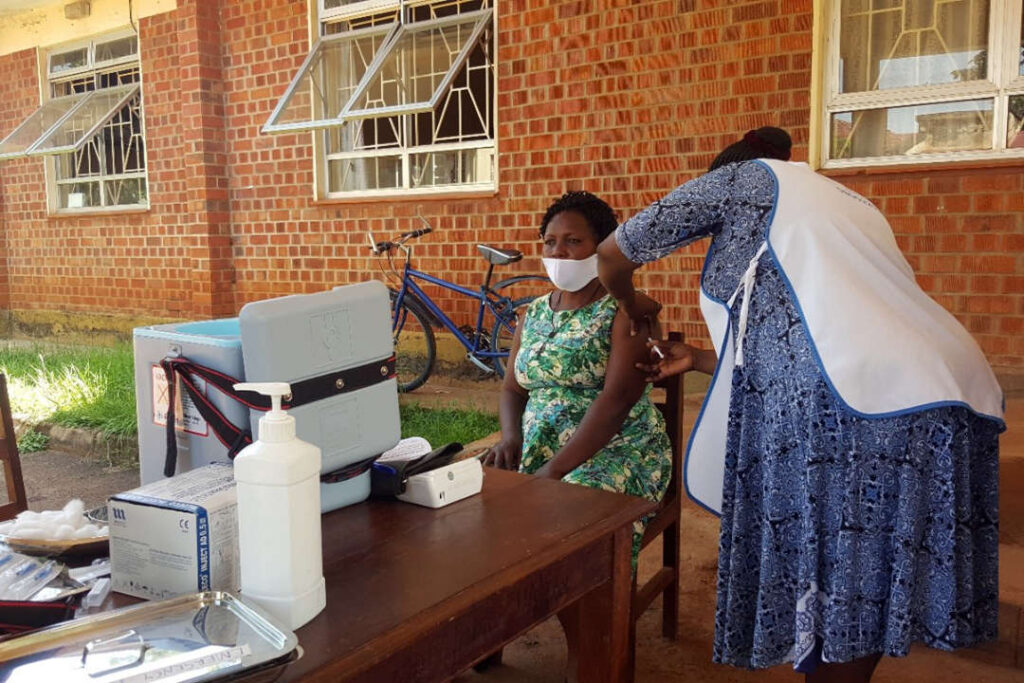
For more than 40 years, URC has implemented health projects across Africa. URC’s work in the region began in 1980 with expanding the service capacity of Senegal’s Ministry of Health and supporting the development of a family health organization, which included training in management, information systems, and health promotion.
Since then, URC has worked in over 30 African countries to improve health outcomes by strengthening health systems, conducting research and evaluation, implementing social and behavior change interventions, and institutionalizing continuous quality improvement to address gaps in malaria, TB, HIV/AIDS, global health security, maternal and newborn health, and reproductive health and family planning services. URC’s impact on HIV testing, treatment, and care services in Africa is a testament to an enduring partnership with the U.S. government, national HIV/AIDS programs, and local and international stakeholders in the region.
URC leads the Department of Defense HIV/AIDS Prevention Programs in Niger, Uganda, and Eswatini, where we have significantly increased the number of military facilities providing HIV testing, care, and treatment to military members, their families, and the civilian communities served by these militaries. Through these projects, URC aims to accelerate progress toward achieving HIV/AIDS epidemic control and work toward the achievement of the 95-95-95 goal – to diagnose 95% of all people living with HIV, initiate 95% of positive cases on antiretroviral therapy, and achieve viral suppression in 95% of those treated.
Using an integrated health systems strengthening approach, URC also supports ministries of health in countries like Mali and Uganda to increase access to and use of quality health services, strengthen sub-national health systems, and increase the adoption of healthy behaviors through the USAID-funded Systems for Health Project, Household and Community Health, RHITES-N, Acholi, and RHITES-EC projects. Our work under the Systems for Health Project in Ghana led to a 78% decrease in under five malaria mortality in 15 hospitals in Ghana’s Northern and Western regions, and a 42% reduction in the institutional maternal mortality ratio in 29 districts across Greater Accra, Northern, and Volta regions in Ghana.
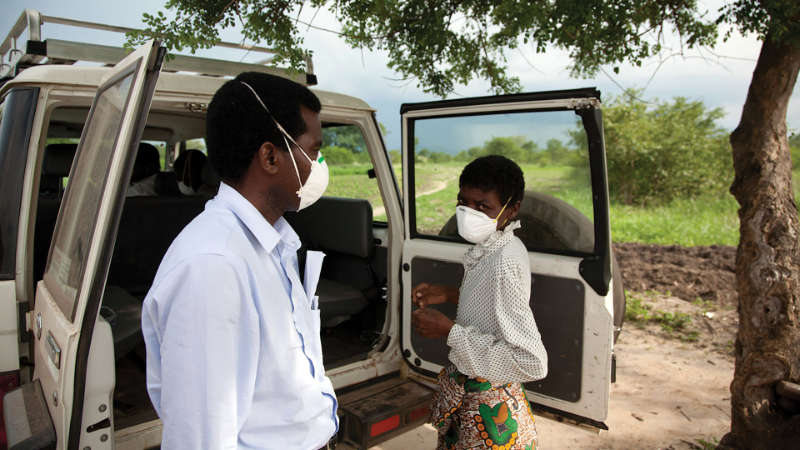
Several URC-led projects, including the USAID Health Evaluation and Applied Research Development (HEARD) Project have carried out global and country-specific activities to support quality improvement (QI) and quality management initiatives and management in Africa – including in Kenya, Malawi, Ethiopia, and Tanzania. These projects strengthened reproductive, maternal, newborn, child, and adolescent health programs. And they increased the diagnosis, prevention, and treatment practices for HIV/AIDS, TB, and malaria, improving the quality of health services. They also strengthened care coordination across the health care delivery systems and institutionalized evidence-based best practices in service delivery and more.
Eswatini
URC is supporting the Government of Eswatini to reduce the number of new HIV, TB, and sexually transmitted infections among its military – the Umbutfo Eswatini Defence Force (UEDF), their families, and the civilian communities served by UEDF Health Services. The Department of Defense HIV/AIDS Prevention Program Eswatini (DoD Eswatini URC Project) is working to achieve 95-95-95 UNAIDS targets towards epidemic control, with which the country has been making progress, including expanding ART.
Ghana
Improving the quality of care requires coordinated, system-wide action with buy-in from key Actors. Through the Quality Services for Health activity in Ghana, URC and its partners and collaborators are integrating our experience in quality improvement (QI), social and behavior change, and gender equity and social inclusion (GESI) to support Ghana’s public and private health system actors to sustainably improve health services quality across Ghana.
From 2014-2019, the Systems for Health Project (S4H) worked directly with the Ghana Health Service to address these challenges. The project enabled the Government of Ghana (GoG) and its health workforce, in direct partnership with the communities they serve, to sustain equitable access to, demand for, and use of high-quality, high-impact health services with reduced external support, especially in the five regions targeted by S4H.
Countries
URC’s experience in the region includes:
